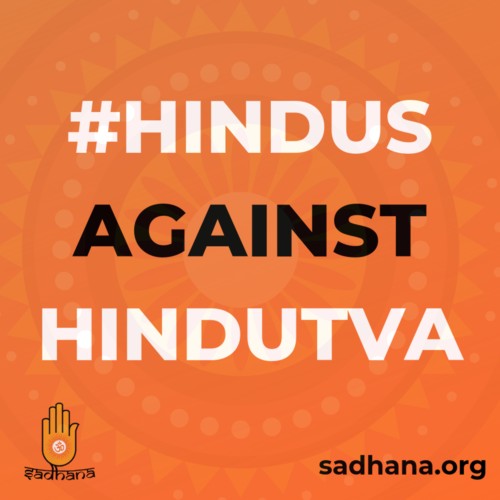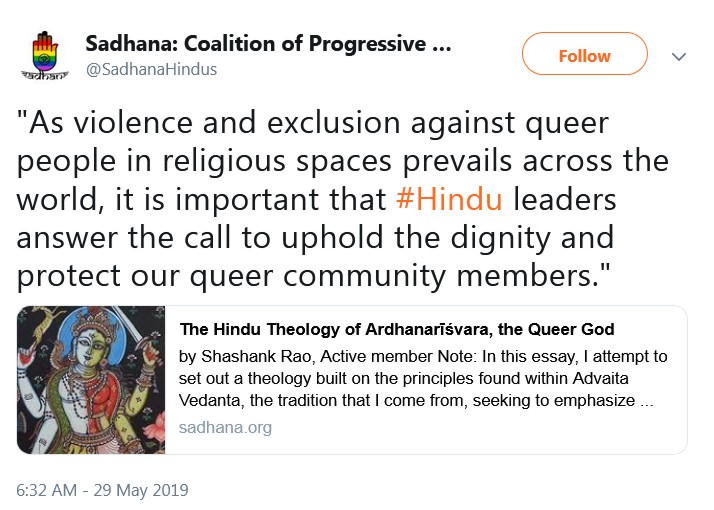This US-based Hindu group is countering Hindutva hatred with its counter-narrative
Sadhana is a coalition of Hindus in the United States and around the world wanting to assert a progressive Hindu voice into the public discourse of our times. Sadhana is a mechanism and a platform for progressive Hindus to speak up and act for progressive social values and social justice.

With around 2000 followers on Facebook, Sadhana: a coalition of progressive Hindus may seem a like a small online group but is perhaps the only Hindu organization in the world to publicly stand against Hindu nationalism. They are creating a counter-narrative in today’s fraught context. Their website blog is a treasure trove of articles on current issues with parallels drawn from Hindu scriptures and literature.
Sadhana is a coalition of Hindus in the United States and around the world wanting to assert a progressive Hindu voice into the public discourse of our times. Sadhana is a mechanism and a platform for progressive Hindus to speak up and act for progressive social values and social justice.
Their vision statement says that they seek to mobilize people of Hindu faith worldwide to positively focus on and assert principles of tolerance and inclusiveness, ahimsa (non-violence), and sadhana (faith in action) which can be found throughout Hindu philosophy, culture, history, and in Hindu religious practice.
Their website says, “Since 2011, Sadhana has been building a progressive Hindu movement. We practice our sadhana, or faith in action, by advocating for those social justice principles we believe are at the heart of Hinduism. We have mobilized Hindus in New York City and beyond to stand up for social justice causes including environmental justice, racial and economic justice, gender equity, immigrant rights, and anti-casteism. We bring a Hindu voice to the interfaith justice movement. We have chapters and members around the country and abroad. We engage and mobilize progressive Hindus nationally and internationally using social media.”
Revelation came to Sunita Viswanath one summer morning six years ago, as she set down to read the newspapers in her living room in Taos, New Mexico; a report on the group by Huffington Post in 2017 said.
“There was a story in The New York Times about Rohan Narine, a young American Hindu community organizer who wanted to screen the 2008 animated movie, “Sita Sings The Blues,” by trailblazing Jewish female director Nina Paley. Narine chose his uncle’s Hindu temple as the location, hoping the screening could be part of a series of events through which young Sikhs and Hindus — the two dominant religions in his Indo-Caribbean community — could “get to know each other.” Narine’s peaceful attempt backfired spectacularly,” the report said.
“Before the screening, Narine was inundated with thousands of hate messages from supposed community leaders who, in turn, organized Hindus to criticize the movie and blamed Narine for insulting the Divine Holy scriptures revered by Hindus. After two unsuccessful attempts, Narine was forced to screen the movie in his own living room and to a much smaller audience,” the report added.
“Sunita Viswanath said she jumped up when she first read this story that morning. As a progressive Hindu, she feels strongly about any kind of censorship and thought Narine had been treated unjustly by his own people. “This man is totally Hindu; his family has a temple. You don’t get much more Hindu than that,” she said in the report.
In response, Viswanath co-founded Sadhana, the Coalition of Progressive Hindus.
“We seek to mobilize Hindus to speak up whenever justice is denied,” said Viswanath. The word “sadhana” means daily spiritual practice in Hindi. For Viswanath and her collaborators, it is “faith in action.” The platform is committed to a vision of social justice, which the members believe is at the heart of Hinduism. The movement’s three pillars include: ekatva (the oneness of all), ahimsa (non-violence) and seva (the responsibility to put one’s shoulder to the wheel in service of struggles for justice everywhere). Together with Aminta Kilawan, an attorney and legislative counsel to the New York City Council, Viswanath founded Sadhana in 2011. Rohan Narine, the resilient community organizer from Queens whose story first inspired Viswanath, joined them as the third co-founder and board member,” the report added.
“The right-wing Hindus have done a fantastic job in organizing. Why can’t we?” Viswanath remembers asking, referring to the “Sita” movie screening backlash, the report added.
“One obstacle is the definition of secularism among Hindus. The progressive world in India is adamantly secular, according to Viswanath. Not wanting to make a fuss about their Hinduism, which has gradually “become synonymous with right-wing Hinduism,” secular Hindus in America, who care about social justice and would potentially be interested in movements like Sadhana, would like to be equidistant to all religions: “They don’t want to alienate Muslims or Christians,” Viswanath said in the report.
“Others warned Viswanath also about an old Indian stereotype: “People think that you can’t organize Hindus around a common cause because of the notion of dharma,” she noted. Dharma is a kind of individual mission statement for Hindus. It dictates the notion of “what I’m supposed to do with my life has nothing to do with what you’re supposed to do with yours,” according to Viswanath. Undeterred by poor prospects, Viswanath and her co-founders felt sure that there was a percentage of devout Hindus who went to the temple regularly, but also believed in justice for all and doing the right thing,” the report said.
Since their founding, Sadhana has been embracing progressive and inclusive values. “We could argue that Hindu theology reveres women, while cultural norms have tended to discriminate against women,” said one co-founder of Sadhana in support of Planned Parenthood. They have also held workshops to address gender-based violence and reached out to other Hindu organizations to explain what it means to be a progressive Hindu. Recently, the movement is focused on fighting racism, casteism and Islamophobia and promoting LGBTQ rights, the report said.
“After six years, more and more Hindus have embraced this kind of progressive Hinduism. Queens activist and current Sadhana leader Rohan Narine may once have been denied permission to screen a controversial film at a Hindu temple. But a little over a week ago, Shaanti Bhavan Mandir, a Hindu temple in Queens, in collaboration with Sadhana, became the first Hindu temple to become a sanctuary congregation in the United States. Addressing nearly 100 congregants after Sunday prayers, the temple’s main priest Pandit Manoj Jadubans said: “There are people in the world today that are confused, they are scared, they feel threatened, and they don’t know what to do, who to turn to, or where to go…Remember a mandir (temple) is not just a place that we come and we pray. It goes beyond that. It’s an institution for higher learning and we are learning how to allow this place to reach out to the public now. You give them shelter, a place where they can come and feel safe and secure and protected,” the report said.
“Shaanti Bhavan Mandir will hold a general meeting in April and invite other Hindu temples to learn about becoming a sanctuary temple. Already, a Hindu temple in Taos, New Mexico, is showing strong interest to become the second Hindu sanctuary congregation in the country. As for Viswanath, who is seeing the movement she helped develop reach new heights, the old adage still holds true: “If you build it, they will come,” the report added.
“I am a Hindu American of Indian origin, a social justice activist and a founding member of Sadhana: Coalition of Progressive Hindus. I consider it my dharma to work for the rights and security of men and women wherever these rights are denied. I have spent much of my life fighting for women’s rights in Afghanistan, in part through criticism of religious extremism in that country. I am also connected to movements in the United States that fight for the civil rights of the poor and marginalised, and protest against racism, sexism and Islamophobia, which motivate those at the helm in America today. Our experience as immigrants and racial and religious minorities in the United States informs our concern for minorities in other places,” Sunita Vishwanath wrote in Scroll.
“Just as my Hindu faith motivates my participation in these struggles, it requires me to speak out about the state of India today. Given the global surge in majoritarian politics and bigotry, and blatant attacks on religious minorities and human rights defenders in Narendra Modi’s India as well as in Donald Trump’s America, I consider it my right and duty to add my voice to the defence of those brutally targeted with violence and repression in both the oldest and the largest democracies in the world. Indeed, next month I will be speaking at a similar briefing in Washington, addressing the religious freedom of the Hindu minority in Pakistan,” she added.
“Hindu voices like Sadhana’s are routinely equated with Hindutva by elements of the Left and excised from progressive social justice circles in the United States and India – despite us working for the very same goals. This is why it is important that the Indian American Muslim Council invited Sadhana to be a part of this briefing, and why we were honoured to participate. Sadhana stands as an organisation that is both Hindu and fiercely defensive of the values embedded in the Indian Constitution, foremost among them being the “liberty of thought, expression and belief,” she wrote.
